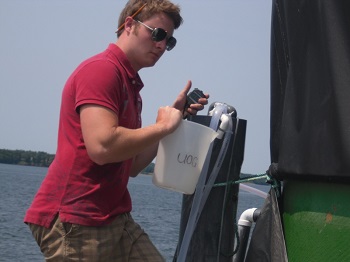AQUACULTURE STUDENT
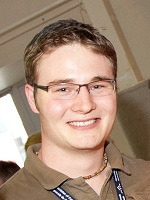
DAVE HUYBEN
What They Did Back Then
* Bachelor of Science, completed 2010, University of Guelph
* Master of Science, completed 2012, University of Guelph
Advisor: Professor Richard D. Moccia
Secondary advisors: Professors Roselynn M.W. Stevenson and Hongde Zhou
Evaluation of Membrane Filtration and UV Irradiation for the Control of Flavobacterium psychrophilum in Recirculation Aquaculture Systems.
ABSTRACT
Flavobacterium psychrophilum, the causative agent of bacterial cold water disease (BCWD), is tolerant of recommended ultraviolet (UV) doses used in recirculation aquaculture systems (RAS). Membrane filtration (MF) is used to remove pathogens from wastewater in many industries, but has not been thoroughly tested in RAS. In this study, bacterial removal efficiencies were assessed between MF and UV treatments over 30 days in an RAS. Bacterial removal efficiencies were not significantly different (p > 0.05) between MF and UV treatments, which removed 98.5 ± 0.4 % and 99.6 ± 0.1 % of total bacteria and 93.2 ± 5.2 % and 92.5 ± 4.1 % of heterotrophic bacteria, respectively. Under laboratory conditions, a MF system was challenged with concentrated doses of F. psychrophilum and achieved 5.8 ± 0.2 log reductions of the pathogen. Therefore, MF represents an alternative to UV irradiation and could be used to reduce the prevalence of F. psychrophilum in RAS, potentially reducing the incidence of BCWD and its impact on the aquaculture industry.
Presentations:
Huyben, D.C. and R.D. Moccia. 2011. The Evaluation of Membrane Filtration as an Alternative Disinfection System in Recirculating Aquaculture Systems and its Comparison to UV Irradiation. Aquaculture Association of Canada Conference. Quebec City, Quebec, Canada. May 8-11.
Huyben, D.C. and R.D. Moccia. 2012. The Evaluation of Submerged Membrane Filtration as an Alternative to UV Disinfection and the Removal of Flavobacterium Psychrophilum from Recirculation Aquaculture Systems. Aquaculture Association of Canada Conference. Charlottetown, Prince Edward Island, Canada. May 27-30.
Huyben, D.C. and R.D. Moccia. 2012. Turning Fish Waste into Clean Water. Ontario Ministry of Agriculture and Food Research Day. Guelph, Ontario, Canada. June 26.
Huyben, D.C., Bevan, D.J. and R.D. Moccia. 2013. Evaluation of Membrane Filtration and UV Irradiation for the Control of Flavobacterium psychrophilum in Recirculation Aquaculture Systems. Aquaculture Association of Canada Conference. Guelph, Ontario, Canada. June 2-5.
Huyben, D.C., Kiessling, A., Vågsholm, I., Boqvist, S., Babol, J., Lundh T. and R.D. Moccia. 2014. Biosecurity Risks When Recapturing Nutrients: A Fish Perspective. Swedish University of Agriculture Food Research Day. Uppsala, Sweden. May 9.
Huyben, D.C., Vidakovic, A., Olstorpe, M., Kiessling, A., Lundh T. and
R.D. Moccia. 2014. Welfare and Food Safety Aspects of Feeding Yeasts to
Salmonids as a Sustainable Protein Source. Aquaculture Association of
Canada Conference. St. Andrew's, New Brunswick, Canada. June 1-4.
-
Thesis: hdl.handle.net/10214/5244
Where They Are Now
After graduating, David worked as a research assistant for the University of Guelph. He revised manuscripts and prepared presentations for former M.Sc. students and helped organize the Aquaculture Association of Canada Conference held in Guelph in 2013. Afterwards, he moved to Uppsala, Sweden and worked as a research assistant with Uppsala University.
Currently, David is enrolled as a PhD student in the Animal Nutrition and Management Department at the Swedish University of Agriculture Sciences (SLU). His degree started in October of 2013 thanks to a scholarship from the University of Guelph with Professor Moccia as his assistant supervisor. David's project focuses on evaluating feed safety and welfare aspects of replacing fish meal with yeasts as a sustainable protein source for salmonids. Experiments will include feeding trials with varying levels of yeasts, post-prandial effects of feeding yeasts and microbiological safety of producing yeasts from wastes. David's work involves collaborations with the National Veterinary Institute and universities in Sweden, Finland, Norway and even Guelph!
SLU website: http://www.slu.se/en/departments/animal-nutrition-management/research/on-going-projects/sustainable-feed-sources-in-aquaculture/
MF system treating wastewater in a RAS at the Alma Aquaculture Research Station (photo: David Huyben).
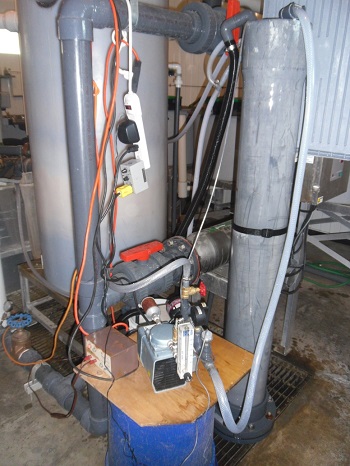
David disinfecting the membrane filter at the St. Andrew's Biological Station, New Brunswick (photo: David Huyben).
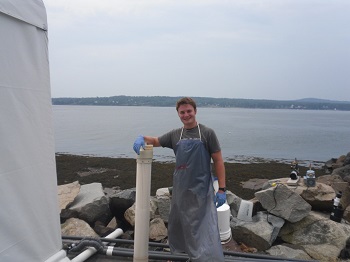
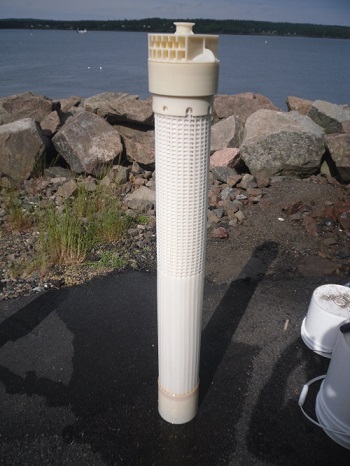
David measuring flow rates of the MF system at the St. Andrew's Biological Station, New Brunswick (photo: David Huyben).
